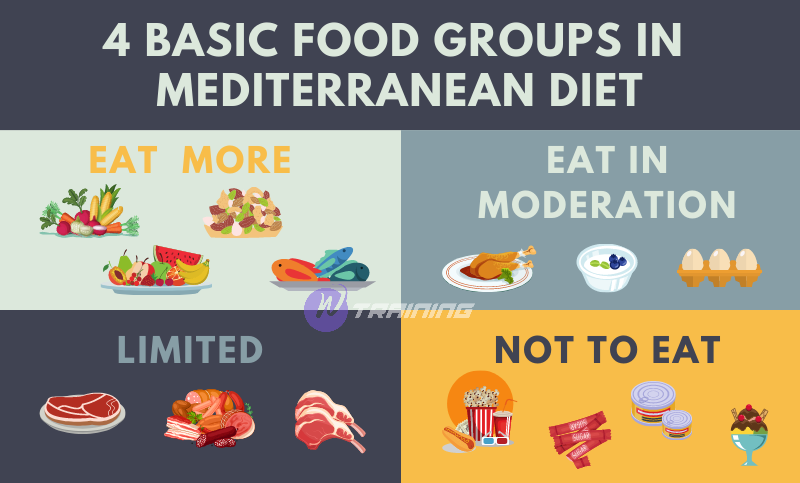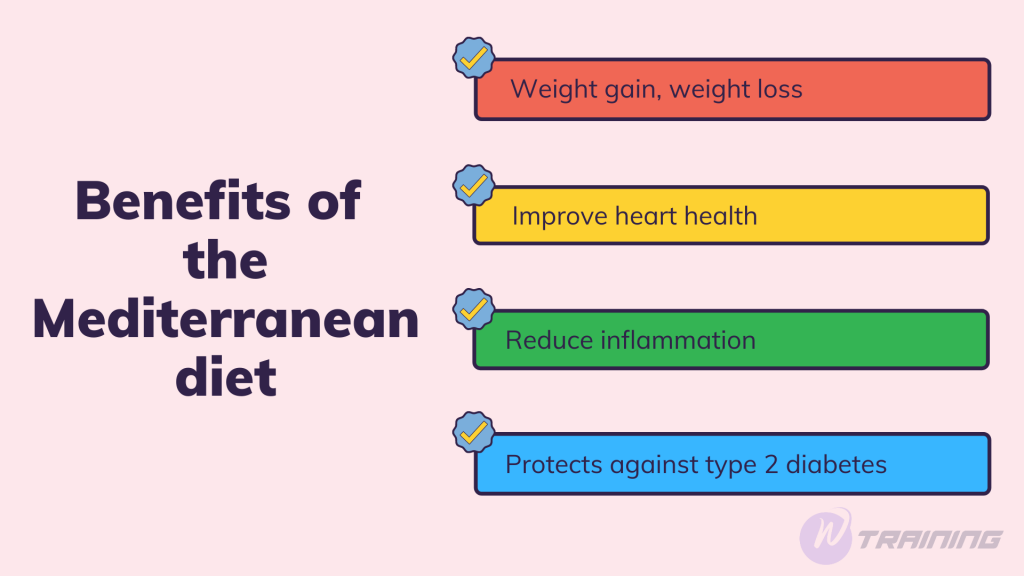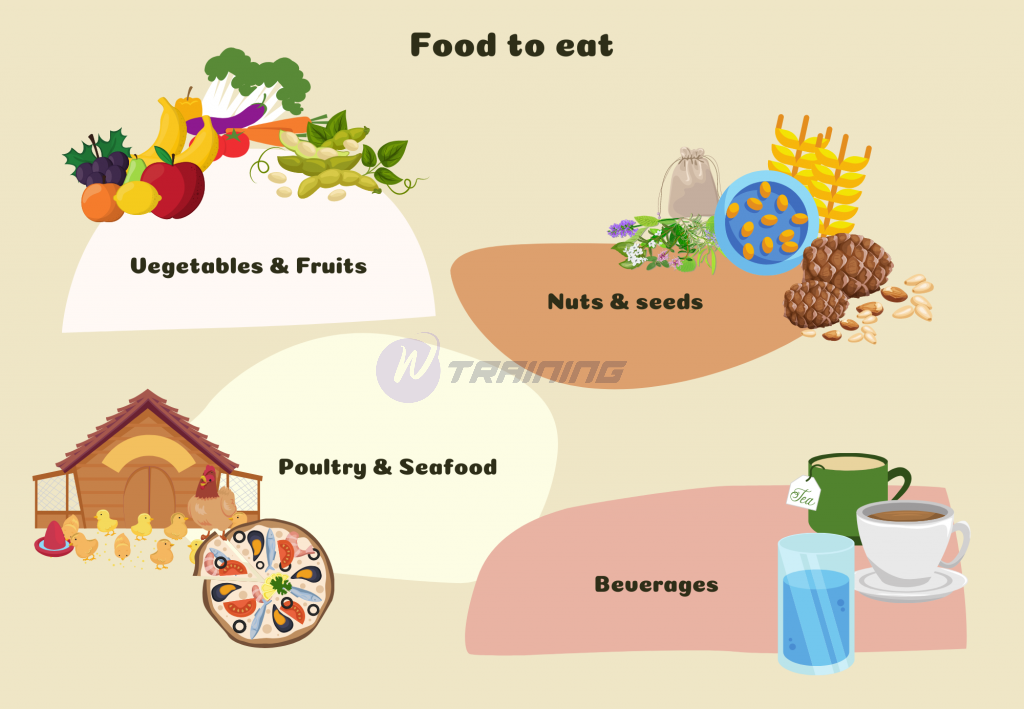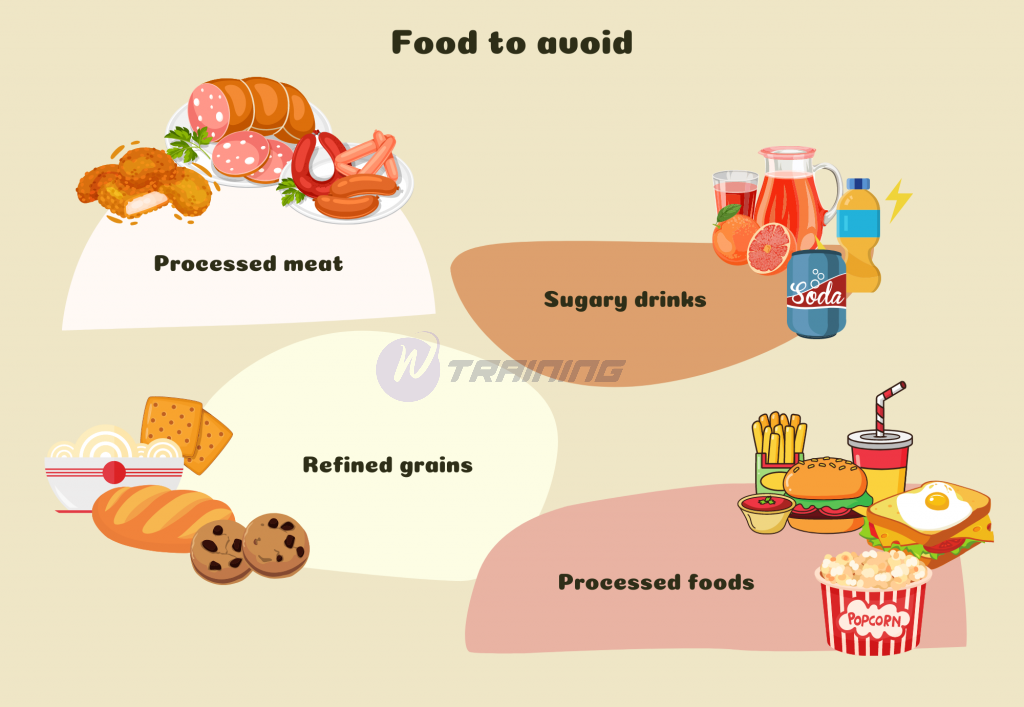Almost all fitness people who are finding a proper diet have heard of the Mediterranean diet – a diet that comes from Mediterranean sea-side countries. Like other healthy diets, it emphasizes mostly nutrient-rich, whole-food ingredients like fruits, vegetables, healthy fats, and whole grains. Is it really effective?
About Mediterranean diet
-
Concept
The Mediterranean diet is derived or in other words inspired by the traditional foods of countries bordering the Mediterranean Sea such as Italy, Greece, France, and Spain. In the Mediterranean diet, healthy ingredients like fish, vegetables, roots, fruits, beans and whole grains are increased in the diet. Reduce ingredients like red meat, dairy products, sweets.
-
Basic principles
In fact, there has not been a single study that can show what the Mediterranean diet is right. However, based on the menus of many countries that have been following this diet, you can still create a healthy menu based on 4 basic food groups:
See also: 14-Day Low-Calorie Meal Plan: Perfect Diet!
Benefits of the Mediterranean diet
The Mediterranean diet has been linked to a number of health benefits. Several studies show that it can increase weight loss, improve heart health, reduce inflammation, and protect against type 2 diabetes.
-
Weight gain, weight loss
The Mediterranean diet encourages eating a variety of nutrient-dense foods and limiting processed and added sugar foods, which are often high in calories. For this reason, combining the Mediterranean diet with a healthy lifestyle can promote weight loss.
A review of 5 studies found that the Mediterranean diet was just as effective as other popular diets such as the low carb diet for weight loss, helping to lose up to 10 kg in 1 year.
Likewise, a large study in more than 32,000 people found that long-term adherence to the Mediterranean diet was associated with a reduced risk of weight gain and belly fat over 5 years.
-
Improve heart health
Many studies have found that following the Mediterranean diet can promote heart health.
In one study, following a Mediterranean diet supplementing with nuts or olive oil for 3 months led to significant improvements in cholesterol levels and systolic blood pressure (the top number of a reading). , both of which are risk factors for heart disease.
Similarly, another study observed that following the Mediterranean diet and eating 30 grams of mixed nuts daily for one year reduced the incidence of metabolic syndrome by nearly 14%. Metabolic syndrome is a group of conditions that can increase your risk of heart disease, stroke, and diabetes.
Furthermore, a review of 41 reports found that the Mediterranean diet was associated with a lower risk of heart disease and stroke in people with diabetes.
-
Protects against type 2 diabetes
Several studies have found that the Mediterranean diet may protect against type 2 diabetes. For example, one study in 418 people noted that people who followed a Mediterranean diet had a 52% lower risk of developing type 2 diabetes for an average of 4 years, compared with a control group.
Additionally, a study in 901 people with type 2 diabetes found that long-term adherence to the Mediterranean diet was associated with lower blood sugar and hemoglobin A1C, a marker of sugar control long-term bleeding.
What’s more, other research shows that the Mediterranean diet can help improve the body’s ability to use insulin, a hormone that regulates blood sugar.
-
Reduce inflammation
Acute inflammation is a normal process that helps your immune system defend against illness and infection.
On the other hand, chronic inflammation can contribute to disease and may be involved in the development of heart disease, cancer, and diabetes. The Mediterranean diet can help reduce inflammation levels, which can help prevent disease. For example, one study in 598 people found that stricter adherence to the Mediterranean diet was associated with lower levels of several markers of inflammation. In another study in 66 older adults, following a Mediterranean diet for 3 years was associated with reduced markers of inflammation.
Types of foods in the Mediterranean diet
The Mediterranean diet is primarily nutritious, whole food ingredients such as fruits, vegetables, whole grains, and healthy fats. Meanwhile, processed foods, added sugars and refined grains should be limited.
-
Food to eat
Here are some foods that you can enjoy:
-
- Fruit: apple, orange, strawberry, kiwi, melon, blueberry, pear, peach, apricot
- Vegetables: spinach, arugula, broccoli, cauliflower, onions, zucchini, asparagus, kale, potatoes
- Legumes: chickpeas, lentils, beans, peanuts
- Whole grains: quinoa, couscous, millet, oats, gbrown rice, buckwheat, whole grain pasta, farro
- Nuts and seeds: almonds, pistachios, walnuts, chia seeds, flaxseeds, hazelnuts, macadamia nuts, sunflower seeds
- Poultry: chicken, turkey, goose, duck
- Seafood: salmon, tuna, trout, mackerel, anchovies, sardines, mussels
- Eggs: egg yolks and egg whites
- Milk: cheese, yogurt, milk
- Healthy fats: olive oil, avocado, olives, avocado oil
- Herbs and spices: basil, oregano, thyme, rosemary, pepper, turmeric, garlic, cinnamon, coriander
- Beverages: water, coffee, tea, red wine (1-2 glasses per day)
-
Foods to avoid
Here are some foods that you should limit or avoid:
-
- Processed meat: bacon, sausage, hot dog
- Refined grains: white bread, crackers, cookies, white noodles, flour tortillas, white rice
- Sugary drinks: juice, soda, energy drinks, sports drinks
- Refined oils: vegetable oil, soybean oil, canola oil, corn oil, safflower oil
- Processed foods: fast food, chips, convenience meals, popcorn
- Add sugar: sugar, ice cream, candy, cookies, baked goods, ice cream
Sample menu for a week
The Mediterranean diet is not too difficult to follow if you know how to plan the menu in advance and take the time to prepare food in advance each week. To save time, you can save a portion of the evening for lunch the following day:
| Day | Meal | Dishes |
| MONDAY | Breakfast | A cup of Greek yogurt with strawberries and oats |
| Lunch | A few slices of whole-grain bread with vegetables | |
| Dinner | A plate of tuna salad mixed with olive oil. You can eat more fruit for dessert | |
| TUESDAY | Breakfast | Oats with raisins |
| Lunch | Tuna salad mixed with olive oil | |
| Dinner | Salad of tomatoes, olives and feta cheese | |
| WEDNESDAY | Breakfast | An omelet with vegetables, tomatoes and onions. You can use more fruit |
| Lunch | Whole grain bread with cheese and fresh vegetables | |
| Dinner | Mediterranean-style pasta | |
| THURSDAY | Breakfast | Yogurt with fresh fruit and nuts like walnuts or almonds |
| Lunch | Mediterranean-style pasta | |
| Dinner | Grilled salmon served with brown rice and vegetables | |
| FRIDAY | Breakfast | Two hard-boiled eggs served with a plate of sautéed vegetables in olive oil |
| Lunch | A cup of Greek yogurt with strawberries, oats, and nuts | |
| Dinner | Grilled lamb served with salad and baked potatoes | |
| SATURDAY | Breakfast | Oatmeal with raisins, nuts and an apple |
| Lunch | Whole grain bread with vegetables | |
| Dinner | Vegetarian pizza made with whole grains, cheese, vegetables of your choice, and olives | |
| SUNDAY | Breakfast | Fried eggs with vegetables and olives |
| Lunch | Vegetarian pizza made with whole grains, cheese, vegetable buffet and olives | |
| Dinner | Grilled chicken, served with vegetables and a baked or boiled potato. You can use more fruit for dessert |
Some notes
No one can say for sure which foods will fit into the Mediterranean diet, partly because each country has a different way of eating it. But basically, this type of eating focuses on plants and eats less meat (except fish and seafood). At the same time, you should also combine it with regular sports activities.
One of the most important aspects of the Mediterranean lifestyle is community. You will find that when your whole family eats together on a healthy menu, making changes to your eating and lifestyle becomes much easier and less stressful.
To sum up, the Mediterranean diet is considered one of the most popular plans among dieters because it’s versatile, rich in flavorful foods, and offers health benefits. Try it and see how it affects your body!
Read more:
What Is A Keto Diet? All Guides for Beginners
28-Day Clean-Eating Meal Plan: Best Diet Plans










